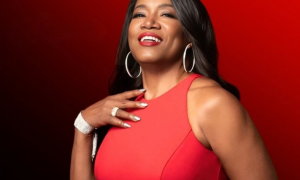 |
This set begins with a sensitive reworking of John Lennon's iconic “Imagine" with Jeff Beck, India Arie, Pink and Seal joining him, and then wends through a multi-lingual, stylistically expansive journey where Dave Matthews, Anoushka Shankar, Wayne Shorter and more weave their magic into his own. Standouts include a blazing cover of Joe Cocker's “Space Captain" with Susan Tedeschi and Derek Trucks at their very best (see a session video for this track at the end of this interview) and “Tamatant Tilay/Exodus" where K'naan, Los Lobos and African marvels Tinariwen create people's protest music that gives Bob Marley work new voice.
It doesn't take long to realize how personal and deeply felt this project has been for Hancock, and JamBase was delighted to sit down with the legend in order to probe the underlying global currents, particularly in the United States, that inspired him to take this musical journey.
JamBase: This new album clearly had to be a labor of love to drag you all over the world..
Herbie Hancock: Absolutely! It's something that's very close to my heart, the whole idea of creating a new future for the peoples of the planet, but a positive one where we actually work together not in conflict but in collaboration.
JamBase: The notion that music is a universal language capable of crossing divides is so commonplace that it's almost like white noise that many dismiss, but it truly is one of the few things that bridges all dialects.
 |
The idea of introducing more languages than English into the mix shouldn't be odd, but the worldwide dominance of English makes it seem so. It's very striking, especially on an iconic song like “Imagine," to hear different rhythms and flavors in familiar places. It shifts your perspective.
It took music from other cultures to stimulate another approach to that song, one that honors a culture outside the United States, in this case Congolese [culture] because the rhythm track is from Konono No. 1. One of the things I thought about is how we live in an immigrant country. Our ancestors came from outside of these shores for the most part. Some are from China, some are from Japan, some are from Africa, some are from Scandinavia or Germany or England or France or Israel or Kuwait or Greece. So, those languages are spoken in those countries. So essentially the languages spoken on my record are the languages of our ancestors.
It's really amazing to think about that, especially in light of recent political events in Arizona and elsewhere in the U.S. The promise of America is that the gates are open and all are welcome. Isn't that the idea? Absolutely! That's what America is supposed to deliver for the 21st century. That's our mission, and we're acting like completely the opposite, ignoring discovering what that mission really is. We're pushing ourselves away from that, and thereby pushing away the hope for a bright future for the planet. We have to deliver that, and I want to help point our attention to who we really are. We are those immigrants; they are our ancestors.
They are US. The world has always embraced America because America has always embraced the world. That got lost for a while but we have the potential to get back to that. Did you have a sense you were making a record that would be as timely as The Imagine Project?
I was definitely thinking about that. I didn't know that this whole issue with Arizona was gonna happen because that just came up. But that just pointed out the timely nature of the issues addressed on this record.
Well, we had 8 years of an administration that continually tried to put up walls and fences. It wasn't like you couldn't see this coming in some ways.
 |
Do you feel some responsibility as an internationally known musician to use what influence you have to pass on these kind of social ideas? I think some musicians are content to play their instrument, compose and be involved primarily on that level. However, my sense is you've always been interested in what's going down on the street, musically and culturally.
I had an epiphany some years ago about how I perceive myself. I've been playing music since I was 7-years-old, and I've always perceived myself as a musician. I was an electrical engineering major in college; science is one of my main interests - I'm a real geek [laughs]. But I no longer perceive myself as a musician the way one perceives themselves as a doctor or teacher or dancer or journalist or construction worker or whatever. People usually define themselves by their job, and it occurred to me that's a really shallow way to look at who you are. To your mother you're not a construction worker or a musician - You're her son or daughter. To your child you're a father or mother. When it's time to vote you're a citizen. You don't walk in as a musician or whatever.
When we define ourselves by our job that identity puts walls between those of us who share that particular identity and other people. It divides us. But at the root of all these different definitions of who we are we're human beings. We may manifest ourselves as musicians, teachers, fathers, sons, neighbors, citizens, African-Americans, European-Americans, etc. but when you really come to terms with the idea of being a human being you remove ALL the walls between you and other human beings. Then you share this commonality.
 |
That's a beautiful goal, and the material you selected for The Imagine Project reflects that kind of innate humanity.
I believe that everyone has that in their heart. We all share that desire. I found that to be true working on this project. Everybody that agreed to be part of this project was happy about it because of what it means.
And I'm sure it was interesting for all of you to find yourselves in musical settings that wouldn't likely occur in their normal routine. Chaka Khan in Mumbai has got to be fun!
Sure, but at the same time, this is the hardest record I've ever made. And [producer] Larry Klein said the same thing. Putting together each song was like putting together a whole album because each one is completely different from one another. So, you have to create a new framework for each piece, and that's a lot of hard work, mentally, listening and absorbing.
Being empathetic to that many people is a challenge. There's a big difference to laying down music with experienced studio cats like Dave Matthews and Marcus Miller versus wild combos like Konono No. 1 and Tinariwen.
We put 'em together but we had no idea what they were going to be like beforehand. You can't just write out everything and expect everyone to follow it, because you don't know what's going to work. Certain hopes we had worked out and others didn't.
 |
You also have the inherent challenge of moving with vocalists on this record. Being a great accompanist is a real art and one some players spend their careers devoted to mastering. Your last two albums [The Imagine Project and River] have you exploring this territory. You have a real knack for dancing with singers. Is this fun for you after years and years of focusing on instrumental music?
It's a whole new ballgame full of possibilities for me. When I did River, which is the music of Joni Mitchell and is framed around the lyrics, I knew that I had to pay particular attention to the words. That really changed me. Now, I want to know what the words are. I want to have a copy of the lyrics in front of me next to the music sheets, so not only do I see the song structurally but also the words and the meaning of the song.
Does emphasizing on the words filter into your fingers and the music?
Yeah, it definitely affects what I do; sometimes in a graphic sense, sometimes in a more improvisational sense. I may have a response to something in the words that later on listening to it months later I can feel a connection between the two without being able to describe what it is. It's just something that feels right.
When I close my eyes and listen to The Imagine Project and River I get a strongly cinematic feeling. This music has sweep and loft, but largely without overplaying that aspect.
Larry Klein and I talked about that at the recording sessions. Quite often we mentioned a cinematic accompaniment concept to the vocals. It takes a lot of care though.
Underplaying is a real talent, especially when dealing with musicians of your stature and the kinds of players you associate with.
I definitely have respect for folks that can do that. Wayne Shorter has made an art out of that.
Both you and he have been pretty fearless with where you've taken your music, and that's not a compliment I offer lightly or often. Most people are happy to set up shop in the jazz cul de sac and never leave. It's a nice world, in its way.
Yeah, I know [laughs]. I like to try and find solutions that are not so obvious. That's what I look for. That's what I live for.





![Full Moon [Feat. New York Voices, Mark Egan]](https://s3.amazonaws.com/allaboutjazz/coverart/large/a07a6f1d5edcd6c801f0e1c3b527da37.jpg)



















